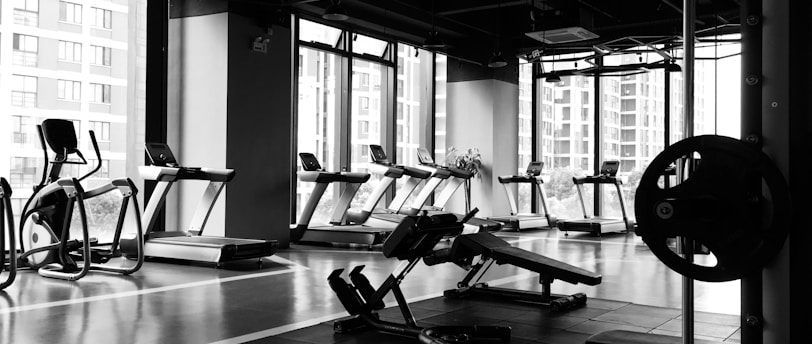Gym Anxiety: What It Is, The Causes & How to Overcome It
FITNESS TIPS
2/28/20254 min read


Understanding Gym Anxiety
Gym anxiety is a type of apprehension experienced by individuals when faced with the prospect of exercising in a gym environment. This phenomenon often manifests among people who are new to working out or those who are returning after a prolonged hiatus. The fear of unfamiliarity, social judgment, and performance inadequacy can lead to significant psychological distress, making the journey to fitness a daunting task.
Several psychological factors contribute to the emergence of gym anxiety. For many, the gym represents a space filled with experienced individuals who appear confident and skilled in their workouts. This perception may lead to feelings of intimidation for newcomers or those lacking self-assurance in their physical abilities. The fear of being scrutinised or judged by others can provoke heightened anxiety, resulting in a reluctance to engage in gym activities. Furthermore, body image concerns and self-esteem issues often compound these feelings, making it even more challenging for individuals to embrace the gym environment.
The signs and symptoms of gym anxiety can vary widely among individuals. Physical sensations may include increased heart rate, sweating, or even nausea when arriving at the gym. Emotionally, feelings of dread, nervousness, or embarrassment can arise, leading to avoidance behaviors. Social fears also play a crucial role; many individuals may worry about interacting with fellow gym-goers or feel self-conscious while using equipment. These reactions can create a cycle where the anticipation of discomfort leads to further withdrawal from fitness pursuits, ultimately hindering the achievement of personal health and fitness goals.
Causes of Gym Anxiety
Gym anxiety is a common experience that can significantly impact an individual’s willingness to engage in physical exercise. Understanding the root causes of this condition is essential for creating appropriate coping strategies. A primary factor contributing to gym anxiety is self-esteem. Individuals with low self-worth often find themselves questioning their abilities and appearance, leading to feelings of inadequacy when navigating a gym environment.
Fear of judgment is another significant factor. Many gym-goers worry about how they are perceived by others, fearing negative evaluations based on their workout performance or physical appearance. This concern is particularly prevalent among beginners, who may feel that they are under a scrutinizing gaze, making them hesitant to seek assistance or even partake in workouts. Moreover, lack of experience can exacerbate these feelings, as individuals may believe they are not knowledgeable enough to perform exercises correctly or safely, which can lead to further anxiety.
Additionally, the tendency to compare oneself to others can heighten feelings of intimidation in a gym setting. When individuals observe others who appear fitter or more experienced, they can feel discouraged about their own progress. Negative past experiences in gym environments, such as feeling humiliated or embarrassed, can lead to a reluctance to return, reinforcing the cycle of anxiety. Furthermore, societal expectations surrounding fitness and body image can add an additional layer of pressure. The pervasive message promoted by fitness culture can lead individuals to feel like they must conform to specific standards, thus intensifying their anxiety when they step into a gym.
These internal and external factors create a complex interplay that can contribute to gym anxiety, highlighting the need for awareness and targeted strategies to address these feelings effectively.
Practical Tips to Overcome Gym Anxiety
Experiencing anxiety in the gym is a common phenomenon that many individuals face. However, with the right mindset and strategies, it is possible to mitigate these feelings and foster a more positive gym experience. One effective mindset shift involves reframing negative thoughts about the gym. Instead of viewing gym sessions as intimidating challenges, consider them opportunities for personal growth and progress. Emphasising individual improvement rather than comparing oneself to others can significantly alleviate stress.
Gradual exposure is another useful strategy for overcoming gym anxiety. Start by familiarising yourself with the gym environment. Spend a few visits just walking around, observing equipment, and noting where things are located. This can reduce unfamiliarity and the associated anxiety when you finally engage in a workout. It may also be helpful to start exercising during off-peak hours when the gym is less crowded. Fewer people can lead to a more relaxed atmosphere, which may ease anxiety levels significantly.
Don't hesitate to seek assistance from gym staff or personal trainers. They are usually more than willing to help individuals who may feel overwhelmed. Asking for guidance on using equipment or understanding gym protocols can foster a sense of belonging and competence. Building confidence is crucial, and setting small, achievable fitness goals can enhance motivation. Celebrate these minor milestones, as they accumulate to foster greater self-esteem and encourage ongoing gym attendance.
On this journey, acknowledge that it is perfectly acceptable to feel anxious, but employing these practical tactics can help smooth the experience. Addressing gym anxiety requires patience, self-compassion, and persistence; gradually, these steps can pave the way toward a more enjoyable and fulfilling workout routine.
Essential Gym Etiquette for Beginners
For individuals who are new to the gym environment, understanding gym etiquette is crucial in fostering a comfortable and welcoming atmosphere. Establishing a foundational knowledge of the dos and don’ts can significantly enhance one's experience while also supporting fellow members in their fitness journeys. One of the primary tenets of gym etiquette is the necessity to wipe down equipment after use. This not only promotes hygiene but shows consideration for others who may be eager to utilise the same machines or free weights. Always have a towel handy, and if available, use the provided sanitising wipes or sprays.
Respecting personal space is another essential component of gym courtesy. While the gym may often be a lively place, it is important to be mindful of others' training zones. Avoid encroaching on another person's space, particularly when they are engaged in their workout. If equipment sharing is necessary, it is proper to communicate openly with other gym-goers, discussing time limits and rest periods to facilitate a smooth experience for all involved.
Engaging positively with fellow gym members is encouraged. A simple nod or smile can initiate a sense of camaraderie among individuals, fostering a supportive environment. Be mindful of gym culture; different facilities may have their own unspoken rules and expectations. Observing how more experienced members behave can provide valuable insights into acceptable conduct. Additionally, being aware of noise levels—such as refraining from loud conversations or excessive grunting—contributes to a more pleasant ambiance for everyone.
Overall, incorporating these basic etiquette principles can significantly boost confidence and create a sense of belonging among beginners in the gym, ultimately aiding them in overcoming gym anxiety and enhancing their workout experiences.
